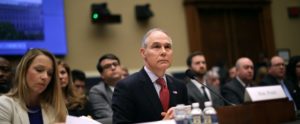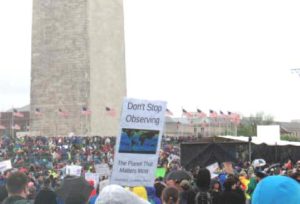 Volume 385, No. 9978 25 April 2015
Volume 385, No. 9978 25 April 2015
WORLD REPORT In recent weeks, the Obama Administration has unveiled several new initiatives to tackle climate change. The Lancet’s Washington correspondent, Susan Jaffe reports.

Surgeon General Dr. Vivek Murthy and President Barack Obama
With less than half of his final term in the White House remaining, US President Barack Obama is no longer confining his efforts to slow climate change to Congress or the courts, where opponents are trying to block new, tougher environmental rules at every turn.
In the past 3 weeks, his Administration has announced a multifaceted public appeal, including plans to expand public access to tracking the impact of climate change with help from such private sector giants as Google and Microsoft, create a coalition of 30 medical, nursing, and public schools to train health-care providers to respond to the health effects of climate change, and host a climate change and health summit at the White House in the spring….
Last month, the Obama Administration submitted a US climate plan to the UN Framework Convention on Climate Change in preparation for December’s global conference in Paris. But the US pledge to reduce greenhouse gases depends in a large part on power plants reducing their carbon dioxide pollution; the US Environmental Protection Agency (EPA) is expected to finalise limits for power plants this summer. Even before they take effect, 14 states and two coal companies have taken the unusual step of challenging the agency’s still uncompleted rules in federal court.
The President is also making the fight personal, recalling, during an interview on national television, that when his eldest daughter was 4 years old, she had such a severe asthma attack that her parents had to take her to the hospital for emergency treatment. “The fright you feel is terrible”, he said.
Obama warned of increased asthma cases and “a whole host of public health impacts that are going to hit home”, speaking after meeting with the medical and nursing schools coalition. [Continued: full text or PDF ]…
 Volume 405, Issue 10490
Volume 405, Issue 10490

 Volume 391, Number 10131
Volume 391, Number 10131 
 president of the United States on January 20, 2018, the federal government ground to a shutdown and hundreds of thousands of women and their supporters rallied against the new president in dozens of cities across the country.
president of the United States on January 20, 2018, the federal government ground to a shutdown and hundreds of thousands of women and their supporters rallied against the new president in dozens of cities across the country. 
 offers the best chance we have to save the one planet we have,” Obama said. “We’ve shown that the world has both the will and the ability to take on this challenge.”
offers the best chance we have to save the one planet we have,” Obama said. “We’ve shown that the world has both the will and the ability to take on this challenge.”